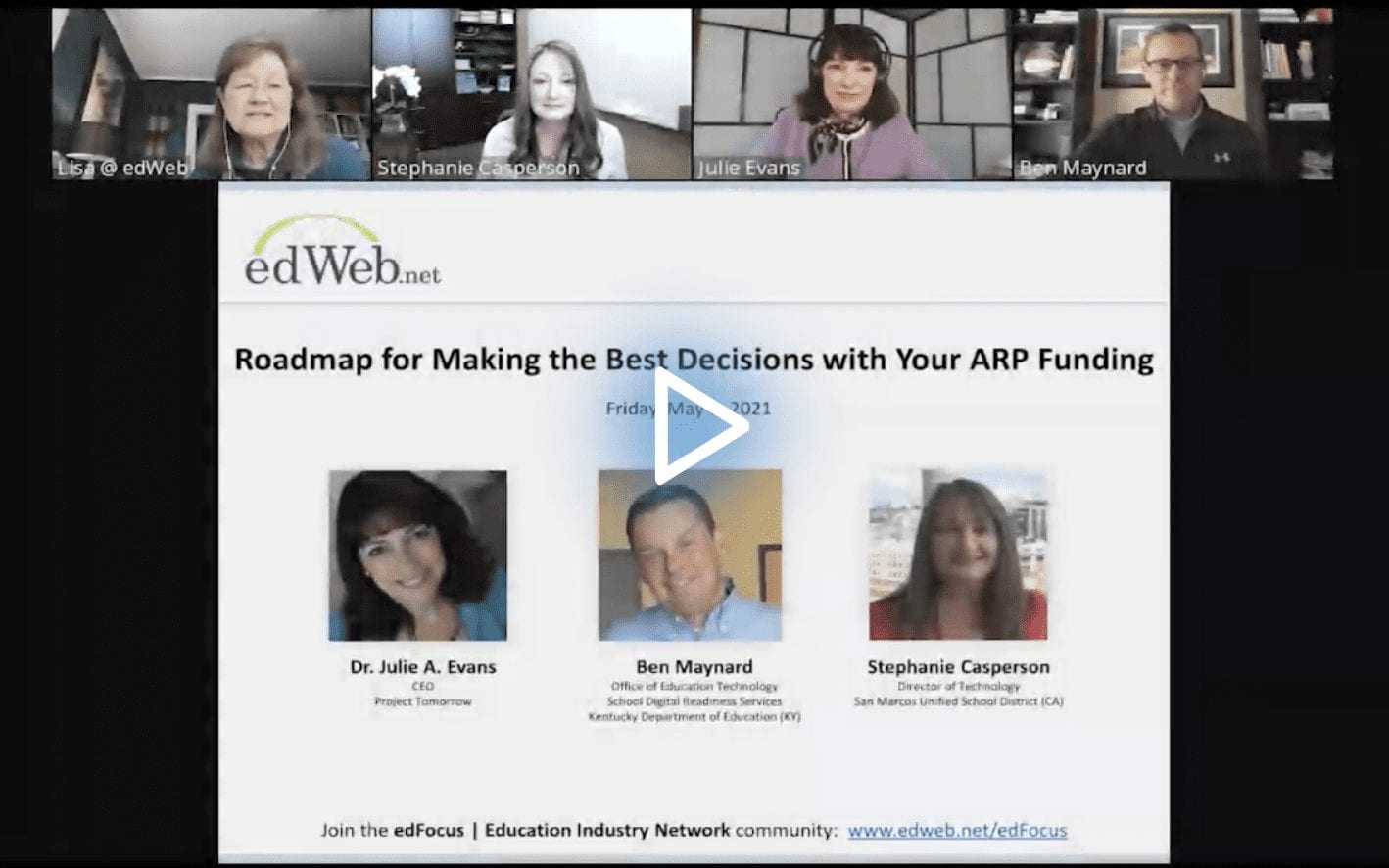Advice for Vendors as Schools Plan for Their ARP Funding
By Stacey Pusey
Even though money from the American Rescue Plan (ARP) is meant to help school districts this year and beyond, the majority of superintendents and school leaders are being cautious with their spending. They want to make sure that any purchases demonstrate they support sustainable change that benefits teachers and learners. In the edWebinar, “Roadmap for Making the Best Decisions with Your ARP Funding,” sponsored by Project Tomorrow, the presenters offered advice to vendors on how to become partners in this new education environment.
- Technology is about more than student engagement. In a recent Project Tomorrow survey, students said they value educational technology more for the ability to create personalized learning than for the interactivity. Vendors should make sure they can show buyers how their products can provide an individual educational experience.
- Virtual learning works best for some students, but not others. While some educators and learners thrived with online schooling, others did not. Rather than trying to say they have a product that works for all students, vendors should focus on explaining the strengths of their product for specific student needs.
- Shiny, new things are definitely out. Every day there’s a new product touting its innovative use of technology, but school leaders are mostly ignoring them. In order to not only use the ARP funds but for any purchases, they are now looking for results. Vendors need to have evidence—of student skill development and academic growth, of increasing student engagement, of enhancing teacher effectiveness—in order to be considered. In other words, they need to have tangible evidence of ROI.
- Third-party validation means more than marketing materials. There are many levels of efficacy research, but many administrators consider it a must-have before they’ll consider purchasing a product. Even start-up companies should perform some form of research to show that their product can meet students’ and teachers’ needs.
- Professional learning needs are changing too. While teachers were already pushing back against PD that’s just about learning how to use a product, they’re now overwhelmingly looking for programs that build their capacity as educators. And just like their students, some are content with asynchronous, virtual learning, while others want a coach to guide them. Vendors will be more successful if they center any professional learning on developing skills that translate to effective classrooms and if they offer a variety of entry points to the professional learning.
- Free trials are like getting a free puppy. Although vendors may have thought it was helpful to offer a free trial during the pandemic, administrators weren’t as keen on them. First, since it was a free trial, they knew they’d either eventually have to make a purchase or retrain on a new system. Second, the free trials required administrators and teachers to constantly learn and integrate new products while they were also trying to deal with pandemic learning. While schools did try some new products that met an immediate need, they weren’t jumping into everything.
Above all, vendors need to know the schools. When approaching potential customers, don’t talk about what a product does; instead, focus on how it can help with a need the school or district has. Make the conversation about the customer and their goals.
This edWeb broadcast was sponsored by Project Tomorrow.
About the Presenters
Dr. Julie A. Evans is the CEO of Project Tomorrow and the founder of the heralded Speak Up Research Project. She serves as the chief researcher on the Speak Up Project as well as leading research efforts on the impact of innovative learning models and interventions in both K-12 and higher education. As a national thought leader and influencer, Dr. Evans leverages her career experiences as a tech entrepreneur and nonprofit leader to stimulate new discussions within the education ecosystem. She is a graduate of Brown University and earned her doctorate in educational leadership from the University of California, San Diego. Dr. Evans serves on several boards and advisory councils and is a frequent speaker and writer on digital learning. She was named in 2020 as the winner of EdTech Digest’s National Leader award and is the longest-serving woman executive in the education technology nonprofit sector.
Ben Maynard, Office of Education Technology, School Digital Readiness Services, Kentucky Department of Education (KY)
Stephanie Casperson, Director of Technology, San Marcos Unified School District (CA)
Join the Community
edFocus | Education Industry Network is a free professional learning community on edWeb.net that will help you connect with colleagues in the education industry to share information and resources, raise questions, and get advice.
Project Tomorrow is a national nonprofit organization with a mission to ensure that today’s students are well-prepared to become tomorrow’s leaders, innovators and engaged citizens of the world. We support that mission with programs and research that focus on innovation and new learning models in the K-12 classroom, including through the effective use of technology.
Stacey Pusey is an education communications consultant and writer. She assists education organizations with content strategy and teaches writing at the college level. Stacey has worked in the preK-12 education world for 20 years, spending time on school management and working for education associations including the AAP PreK-12 Learning Group. Stacey is working with edWeb.net as a marketing communications advisor and writer.




Comments are closed.